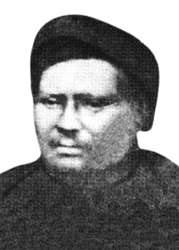Ishwar Chandra Gupta
Ishwar Chandra Gupta (Bengali: ঈশ্বরচন্দ্র গুপ্ত; 6 March 1812 – 23 January 1859) was a famous Indian Bengali poet and writer. Gupta was born in Kanchrapara, North 24 Parganas, West Bengal, India.[1]
Ishwar Chandra Gupta ঈশ্বরচন্দ্র গুপ্ত | |
|---|---|
 | |
| Born | 6 March 1812 |
| Died | 23 January 1859 |
| Nationality | Indian |
| Occupation | Poet, scholar and writer |
Early life
Ishwar Chandra Gupta was born in a Baidya family. He was brought up in his uncle's house after the death of his mother. Gupta spent most of his childhood in Kolkata. At that time, poets were named Kobiwala and the kobiwalas were not so civilized in language. Sexual words and clashes were common. But Ishwar Chandra Gupta created a different style of poetry.
He started the newspaper Sambad Prabhakar with Jogendra Mohan Tagore on January 28, 1831,[1] which finally became a daily on June 4, 1839. Many Bengali writers of the 19th century started their careers with that magazine.[2] He reintroduced into Bengali poetry the mediaeval style with double meaning (already seen in Sandhyakaranandi and Bharatchandra):
- কে বলে ঈশ্বর গুপ্ত, ব্যপ্ত চরাচর,
- যাহার প্রভায় প্রভা পায় প্রভাকর।
- Ke bole Ishwar Gupta, byapta charachar,
- Jahar prabhaye prabha paye Prabhakar..
'Ishwar' means God, 'Gupta' means hidden and 'Prabhakar' is the sun. So a translation runs:
- Who says God is hidden? He is omnipresent
- From Him the Sun gets its luminescence.
Also, Ishwar (Chandra) Gupta ran the journal Prabhakar. So a second meaning of the poem, making a tongue-in-cheek reference to the author, runs:
- Who says Ishwar (Gupta) is hidden? His reach touches the world
- For his brilliance makes the Prabhakar luminescent.
Literary style
He brought modern era of poetry in Bengali. He did not describe the life of Gods and Goddesses, but the daily life of human beings. He also wrote biographies of many Bengali poets and musicians.
Ishwarchandra Gupta always satires the so-called modern class who blindly followed the colonial British power.
- Tumi ma kalpataru
- Amra shob posha goru
- Shikhi ni shing bankano
- Khai kebol khol-bichuli-ghash
- Jano ranga amla
- Tule mamla
- Na bhange gamla
- Tule mamla
- Ma!
- Pele bhushi
- Tatei kushi
- Ghushi khele bachbo na!
- Tatei kushi
Political views
In the early days he was a conservative, opposing the Young Bengal movement as well as frowning on widow remarriage. His views on widow remarriage put him at odds with Ishwar Chandra Vidyasagar. He was one of the earliest advocates of a Hindu view of Indian society. Later in his life, his views began to change and he championed the cause for the remarriage of virgin widows and women's education.[1]
Important works
- Life of Bharat Chandra Roy
- Probodh Pravakara
- Kobitabolir Saar Sangraha
References
- Kahaly, Anirudha (2012). "Gupta, Ishwar Chandra". In Islam, Sirajul; Jamal, Ahmed A. (eds.). Banglapedia: National Encyclopedia of Bangladesh (Second ed.). Asiatic Society of Bangladesh.
- "Bangla Literary Magazine & Editor". Archived from the original on 2 March 2012. Retrieved 10 January 2012.